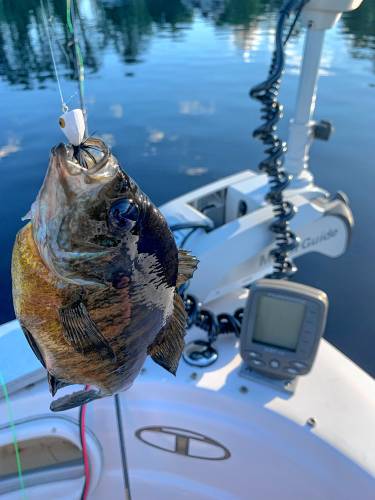Published: 6/30/2022 4:31:42 PM
Modified: 6/30/2022 4:31:42 PM
This writer began using a fly rod as a boy growing up spending his summers fishing on White Pond in South Athol. The fly rod was an old one and the fly of favor was a cork popping bug. They were sold in Aubuchon Hardware and the yellow and white ones worked best on the bluegills that were the target. Over time, my efforts at casting got better and hours of casting led to me becoming pretty good at getting the bug to land where it was supposed to, and my coordination and sheer determination eventually paid off.
My trout fishing was mostly in small local brooks and the fishing was stalking quietly along the stream bank and dunking earthworms, not nightcrawlers, for native and stocked brook trout. It would be years later when the art of delicately presenting a fly, matching an insect hatch, would reach my radar. A lot of brookies ended up in the wicker creel after they darted out from undercut banks to gobble up those worms that were dug up in the lawn. One needed to be careful and replace the dirt and grass and “leave no trace” or there would be hell to pay!
But fly casting in the summer became something that was a special treat. We fished hard, and competitively, all summer. Many contests were hotly contested with my sister Maureen and other White Pond summer residents and, as my memory serves me, I won them all! Using nightcrawlers and a bobber, we caught perch, bluegills, pickerel, largemouth bass, pond shiners and the occasional horn pout. We did occasionally throw artificial lures with Daredevils, Mepps spinners, Flatfish and Al’s Goldfish used, as well as the artificial nightcrawler with red beads and a spinner.
That was all fun, but time spent with a popper on the fly rod was special. As an adult, my life took me to places where fly fishing was revered. It brought me into contact with people who were expert fly casters. My father, John Roche, was rifle instructor at the Massachusetts Junior Conservation Camp and Henry Guidi, the fly-casting instructor, became his good friend. Through Henry, my knowledge of fly casting grew. He talked of the formal art of fly casting, as taught in England, where students were required to hold a newspaper tight to their body with their right elbow and lock their wrist to use the correct form. Listening to Henry, a marvelous teacher, my eyes were opened as he taught that the line on a fly rod did the work, and the rod passed the energy to the line. He made you understand that the tighter the loop, the more skilled the caster. “Let the rod do the work,” Henry would say.
Later in life, the chance to learn fly casting from Bonnie Holding, at Tim Pond Camp in Maine, presented itself and that was my graduate degree. She saw my lifelong habit of using my wrist and made me tuck the rod butt in my sleeve. Lifelong habits die hard! Saltwater fly casting with big rods and big flies for striped bass was also an education and at one time yours truly served as fly casting instructor at the Conservation Camp. I was no Henry Guidi but on more than one year some young person with no previous fly-casting experience would win the camp casting championship.
This past week, the fly rods were out and the White Pond bluegills cooperated. On a light four-weight fly rod they are real fun. Occasionally, the cork poppers get grabbed by a bass and that is a thrill as you attempt to keep the largemouth from getting to cover like lily pads and you have to control the fish using the rod, as the leader is usually four-pound test or smaller. My rod collection also includes a Thomas & Thomas 7 weight rod with an Orvis Battenkill reel that was purchased to catch Minnesota Boundary Waters smallmouth bass and it did a great job back when my life as a teacher and Mahar Fish ’N’ Game Club advisor made those trips possible. The outfit is also a great striper combo, but it has been a while since it was used. The bluegills, however, are always there and always oblige and when they hit the popper, this guy is 12 years old again and life is good!
My bass fishing year has also begun and Wednesday evening the bass were very eager to gobble up a green and white Senko. There were no mosquitoes, and it was a beautiful night to fish and relax. Life is indeed good!
Mike Roche is a retired teacher who has been involved in conservation and wildlife issues his entire life. He has written the Sportsman’s Corner since 1984 and has served as advisor to the Mahar Fish’N Game Club, Counselor and Director of the Massachusetts Conservation Camp, has been a Massachusetts Hunter Education Instructor for over 40 years and is a licensed New York hunting guide. He can be reached at mikeroche3@msn.com.
Credit: Source link






























